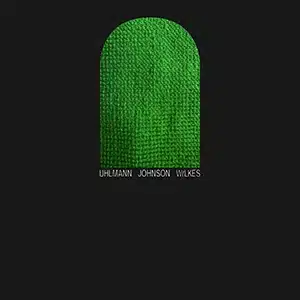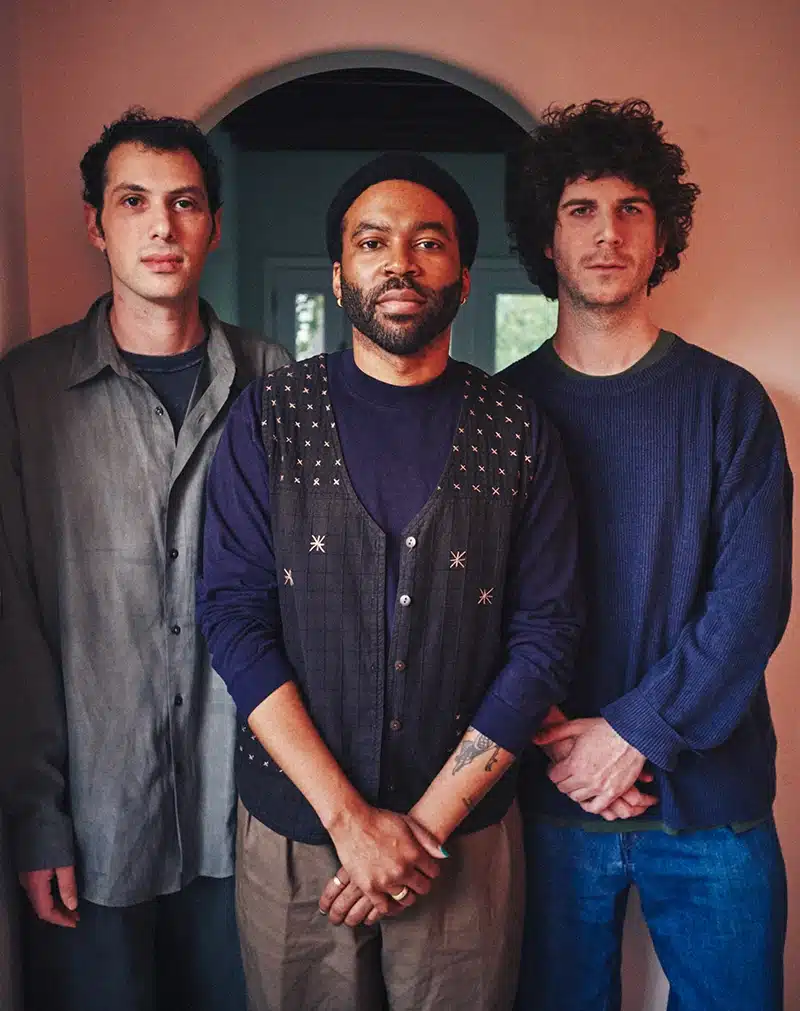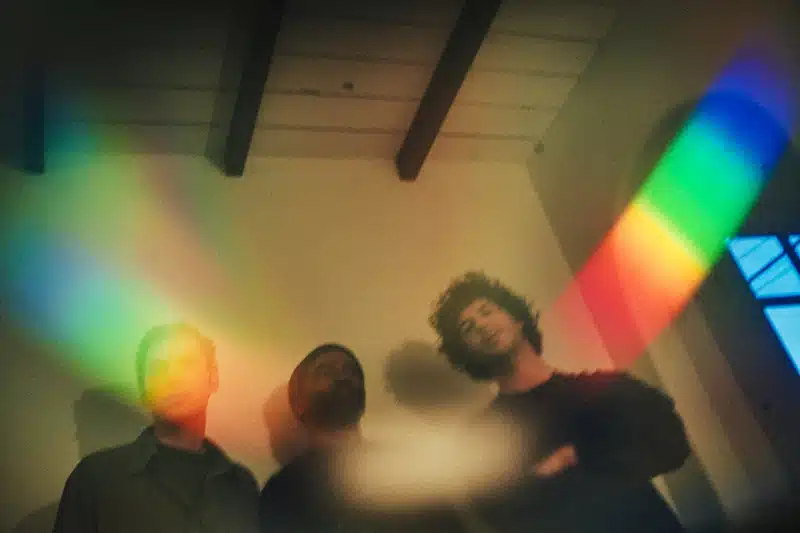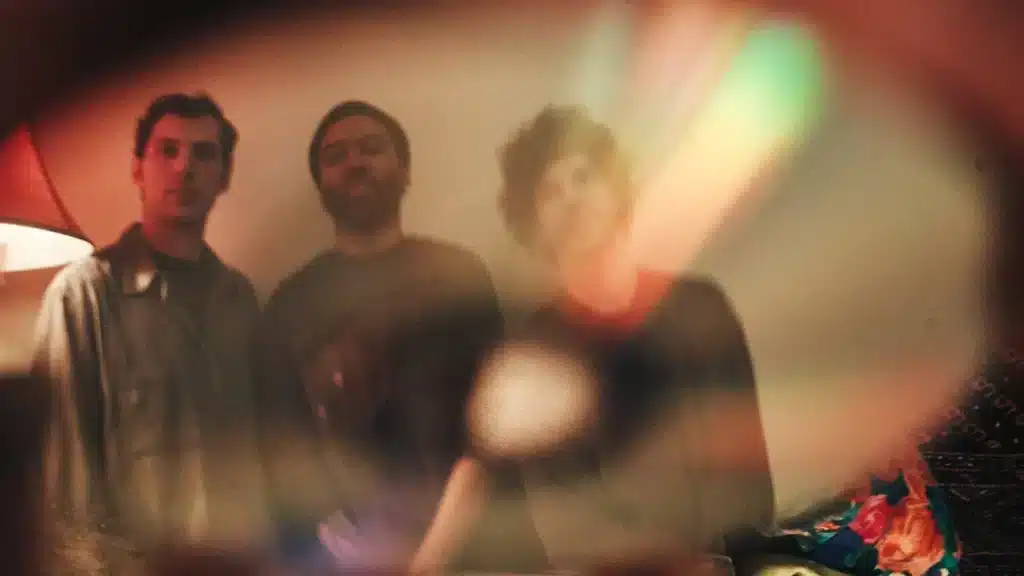
After discovering Phish due to an ice cream flavor, Los Angeles avant-bassist Sam Wilkes’ new trio record shows just how distinct a legacy he’s carved for himself.
 Uhlmann Johnson Wilkes Gregory Uhlmann, Josh Johnson and Sam Wilkes International Anthem 3 April 2025
Uhlmann Johnson Wilkes Gregory Uhlmann, Josh Johnson and Sam Wilkes International Anthem 3 April 2025
Sam Wilkes is not on TikTok, and that’s OK. Shortly before speaking to the Los Angeles-based bassist and avant-jazz figurehead, I did a quick search on the video-sharing app to see what people were posting about him, and outside of his records coming up on lists of recommendations for chilled-out records, one guy was out there challenging himself to “learn a Sam Wilkes bassline” every day. In truth, I didn’t scroll much past his third day of trying it, but the fact that Wilkes could inspire someone to do such a challenge was notable by itself.
While Wilkes thought the idea of someone learning all his basslines was wild, that is nothing compared to the challenge that Wilkes has set up for himself, constantly challenging his creative process.

“There’s this guy, a great film composer named Mark Mothersbaugh, [and] as a little 13-year-old, who thought The Life Aquatic looked like a cool movie, [had] my dad buy the soundtrack on CD,” Wilkes recalls. “I read an interview with him once a couple of years ago where he talks about how ‘I’ll work on a score for a second, and then I’ll go into another room and I’ll work on painting, and I’ll go into another room and just play music.’
“[He has] his multidisciplinary practice within his process, where he’ll allow himself to move between different things as the muse takes him, or just as he follows his interest. I have ADD, so that really spoke to me because I’m like ‘God, I don’t want to have ever to force myself to do anything.’ […] I’ve always got to be working on something. My interest is stimulated, essentially and naturally, things begin to take shape. The more I do that each day. I’m just getting a little bit closer to whatever the result might formulate into, you know? Sometimes I’m aware of it beforehand. Other times, I’m not. But it always takes shape one way or another.”
Sam Wilkes’ work ethic has resulted in an already comprehensive songbook, ranging from playing in the band Knower with his keyboard buddy Louis Cole (they once opened for a Red Hot Chili Peppers tour in Europe) to dropping a series of collaborative experimental records with his long-standing saxophone collaborator Sam Gendel to self-releasing a turn towards indie-rock via 2023’s stellar Driving. Frequently seeing his work housed under the progressive Los Angeles experimental Leaving Records label, Wilkes saw his moody, spritely, and richly melodic works spread across any number of styles with a robust set of collaborators.
Uhlmann Johnson Wilkes, his latest, continues Wilkes’ recent tradition of just naming albums after the names of those involved, which in this case include saxophonist Josh Johnson and guitarist Gregory Uhlmann. While each player gets one credited solo writing credit each, much of the album is credited to the trio, save for the seven-minute closing cover of the Beatles‘ seminal classic “Fool on the Hill”.
“I love composing. I love playing my own tunes. I love playing covers, you know?” beams Sam Wilkes. “Then you see how the people play it. Specifically with ‘Fool on the Hill’, I had been asked to do a gig that didn’t really go well. It was like a Beatles cover gig with a bunch of really amazing musicians. And it was a last-minute thing, and I remember we did ‘Fool on the Hill’, and I was really disappointed by how that went. I wanted another crack at it because I love that song so much. I wanted saxophone, guitar, and bass.
“I was like, ‘That could be an interesting ensemble, orchestrationally, to try out this song and this melody.’ There was not much thought other than, ‘Oh, this would be interesting,’ you know? It’s just that simple. What’s cool about that song is that’s how we opened our first performance together. That’s the first thing we ever played [as a trio]. That’s the first recording from the first performance. It’s an album closer, too.
“But yeah, so that also is kind of a little bit of synecdoche moment, I think, for the sound of the record. I want to keep following my interests, and sometimes that’s writing and expressing all my ideas, and other times it’s arranging and or just being like ‘I love this song, I want to play it.’”
A month before this interview, I had seen guitarist Nate Mercereau play a Saturday afternoon gig at the Claremont Colleges with percussionist and scene figurehead Carlos Niño, along with saxophonist Aaron Shaw, all of whom work in the same reality-warping musical ecosystem that Wilkes is in. When the hour-long set was over, Mercereau noted in a student Q&A that he records everything, and even during this set, filed away a few moments that could make for good standalone songs or maybe a live EP or a new type of collaborative album. This philosophy of always recording every performance speaks to Wilkes, who grew up knowing the power of cataloging musical moments.
“I like to record every gig,” Sam Wilkes notes. “It’s just been something that has kind of been happening very naturally for me since I started playing music regularly. That documenting all started happening recently. I love archival work in general, which I’ve done naturally with music. I mean, my iTunes is insane. I still keep it up. I was in middle school, burning my own CDs and writing. I was a big Deadhead growing up. I was really into Phish as well, and there’s a big taper community within that world. I was shown the beauty of documentation, just hearing where these bands were at all these different times and knowing the difference between the fall tour in one year versus the earlier spring tour and what went on there.
“I was always making my own CDs and downloading shows on BitTorrent. I was always into archival work. I always have been. My dad’s a professional photographer, and his archive is in the house, and you know? I’ll always look at the slides growing up. I grew up around (the idea to) catalog your work, essentially. So when I started playing, it was always like, ‘Oh, we should record this,’ and sometimes it was like voice memos on my iPhone, sometimes I’d bring out a cassette machine. Other times, if we play more of a traditional concert space and there’s a sound person, it’s like, ‘Make sure that you’re recording the stems, etc., as isolated tracks so I can retrieve them afterwards.’
“If a jam kind of happens, it’s more so going to be like at a studio or something. But it’s kind of going in with the intention of, ‘Let’s see what this group of people will do together.’ Like my album, One Theme & Subsequent Improvisation, is like that. I just love documenting everything. It’s the greatest.”

Throughout Uhlmann Johnson Wilkes, the ensemble develop a rich pocket of echoing guitar plucks, floating horn lines, and Wilkes’ ever-shifting liquid basslines. The result is as immediate as it is mysterious, with several tracks clocking in under three minutes, allowing the listener to dive into this rich musical world without fearing a deep multi-hour commitment. While the trio’s chemistry is immediately apparent on first listen, the record still came together somewhat haphazardly.
“With Greg and Josh, I’ve known them both for a really long time and admired both of their work,” Sam Wilkes reminisces. “This kind of moment finally happened in 2022, where it was like, ‘We should be doing something together,’ and so a gig got booked. We have like one rehearsal for it. We knew we wanted to improvise, but I had requested, and they had too, [that] maybe we should all bring in some of our pieces, you know? Just so we have some landing zones, as we say, to arrive at between these moments of freedom.
“I find that if you have some composition, some melody to get to when you have a gig that’s more based on improvisation, it makes the improvisation more effective. Ultimately, it always still ends up being all ‘up to the moment.’ But there’s something that I find so beautiful about getting to arrive in a clear melody, you know? So basically, that ended up happening for that gig.
“I have this tune that I never play live,” Sam Wilkes continues. “It’s a song called ‘Unsure’. It’s on an album called Live on the Green. I just thought they would sound really good on it. Greg brought one in. Josh brought in one of his. I requested that we do ‘Fool on the Hill’. It’s just so natural. We did the first gig and it was really special. We were like ‘We should do another one, see if we can have another pass at certain things, and maybe even do a new repertoire.’ We did the same thing. It was like, ‘Wow! This is great. Maybe let’s have one more day to see if we want to do anything else.
“It just happened so fast and seamlessly over this period that just worked for all of us, but the finishing process was really interesting. We were all together. We all got to go through the sequencing, and really allow it to have a flow was very intentional and composed as an album. That was amazing to do for all of us to be kind of huddled around the computer with our coffee. Pressing play, closing our eyes, and just seeing what feels right for the order and when.”
Once completed, the group reached out to International Anthem’s founder, Scottie McNiece, to write a bio, having previously done one for Uhlmann and Johnson’s other act, SML. After spending enough time with it, McNiece wondered why he wasn’t putting out the LP himself, which the trio soon agreed to. Yet part of International Anthem‘s appeal was their release technique. While the album came out more than a few weeks ago, initially it was available on Bandcamp, while only the three-track single “Marvis” was posted to Spotify. In negotiating the line between art and commerce, Wilkes was excited to see this fractured-release methodology so thoughtfully employed.
“International Anthem is a really cool thing,” Sam Wilkes beams. “They’re incredibly record store oriented, which, as a record head, is so amazing. What they like to do is they have a physical release date and a digital release date, and the physical release date allows the records to get sent to record stores if they want to carry the record, and can incentivize people who hear the single. I think that’s so cool. I’ve never done it that way before, and it’s been amazing to see.
“It’s really beautiful, honestly, and it just makes you so happy. It’s being carried in like Amoeba and Record Surplus. Record Surplus is where I got the Chaka Khan & Rufus Masterjam LP, which is really important for me. I got Smackwater Jack by Quincy Jones there. My records are carried in a bunch of shops, obviously, but it was just cool to see the level of different stores that it was going to. As a result of this process, I think it’s so beautiful to give the record stores the moment you know to just be like, ‘Yeah, if you want it, you got to go there.
“You go to Bandcamp.’ It worked out really great, other bands I’ve worked with like this band Knower, that I did. They did a similar thing where they only did singles on streaming, and if you wanted to get the full record, you had to buy it on Bandcamp. My collaborator, Jacob Mann, also does that for his solo releases, but I never did it for one of my records, and it just happened that they wanted to do it that way. And I was like, ‘Yeah, let’s give it a shot. Like, that’s the flow. Let’s do it.’”

During our conversation, Wilkes discussed his time celebrating his 25th birthday while on the road in Italy and noted how the jazz standard “Caravan” is quoted somewhere in his discography, but he leaves it to fans to suss out exactly where. Yet through his already-lush and revered career, one final question was pushed about his non-musical influences, to which his answer was instantaneous.
“My family,” Sam Wilkes replies with zero hesitation. “So important to me; everyone in my family is so unique. There are such amazing people. Fandom is a very big thing with my family, especially with music. My uncle’s the biggest Steely Dan fan I know. My mom’s brother is the biggest Deadhead, and my dad is a huge Motown head. But also love the most amazing taste in music. My dad got me all my first jazz records, and my mom is a huge Joni Mitchell fan, Crosby Stills and Nash fan, and Carole King fan, and you name it. I just grew up surrounded by such amazing music.
“Music was just so cool to me because of them,” he continues. “It was also just something that was a part of who you were. You know, it was a part of your identity. It was the counterculture that you were a part of. I just became obsessed. At first, it was Southern hip-hop; that was my first true fandom. As a fifth grader in Connecticut, I was obsessed with OutKast, Goodie Mob, and Sleepy Brown. It was crazy. Then I got more broadly into hip-hop.
“My dad, every summer, would take me to go to Sam Goody. It’s a great CD store back in the day, and he’d be like, ‘OK, you can get three to five CDs for the summer.’ It was the greatest thing; we liked the summers. I was like, ‘Oh, my God! I was so excited!’ I remember there was this Ben and Jerry’s ice cream called Phish Food, and I was like, ‘Oh, that’s a band!’ I remember, like the summer before, some dad was like, ‘Oh, you’re eating Phish. This is my favorite flavor.’ And so I was like, ‘Oh, yeah, you like the band Phish?’
“I knew a lot about music at that time [because] I was watching VH1 and MTV and stuff. But of course, they never played that band, and you know, I knew about the Dead, and I started to get into them because of my uncle. I got a Phish CD, and I had this really cool camp counselor that summer who was blown away that I had this Phish CD. I just got it because I thought the cover was cool. Growing up on the East Coast, you know there’s a real counterculture of hippydom and of loving the Dead and Phish.
” I began to just realize I was like, ‘Oh, man, these are … kind of like my scene, you know?’ I then became really obsessed with the Dead and Phish, which my uncle encouraged. But then, I was listening to improvisational rock music and also hearing Frank Zappa because of Phish all of a sudden, and my dad’s like, ‘I really think you would like jazz.’
“My dad, this one summer, actually brought the summer camp I went to, My Favorite Things by John Coltrane, and Birth of Cool by Miles Davis, and I remember putting on the first track, ‘My Favorite Things’, and it changed my life. It was like, ‘Oh, I’ve been waiting to hear this music forever.’ It was like getting struck by lightning, you know? From that moment on, I became obsessed with jazz. It’s too much to talk about all my influences. Honestly, it’s just that my family hooked it up for me in terms of a musical upbringing. It’s the roots of all the foundations of inspiration for me and my music.”
Even with the digital release schedules, avant-garde leanings, and TikTok trends, Wilkes will always be a traditionalist at heart. Even for a record as sleek and modern as Uhlmann Johnson Wilkes, Sam Wilkes’ heart and infectious love of all genres remain proudly old-school. Just as his family would’ve wanted.


